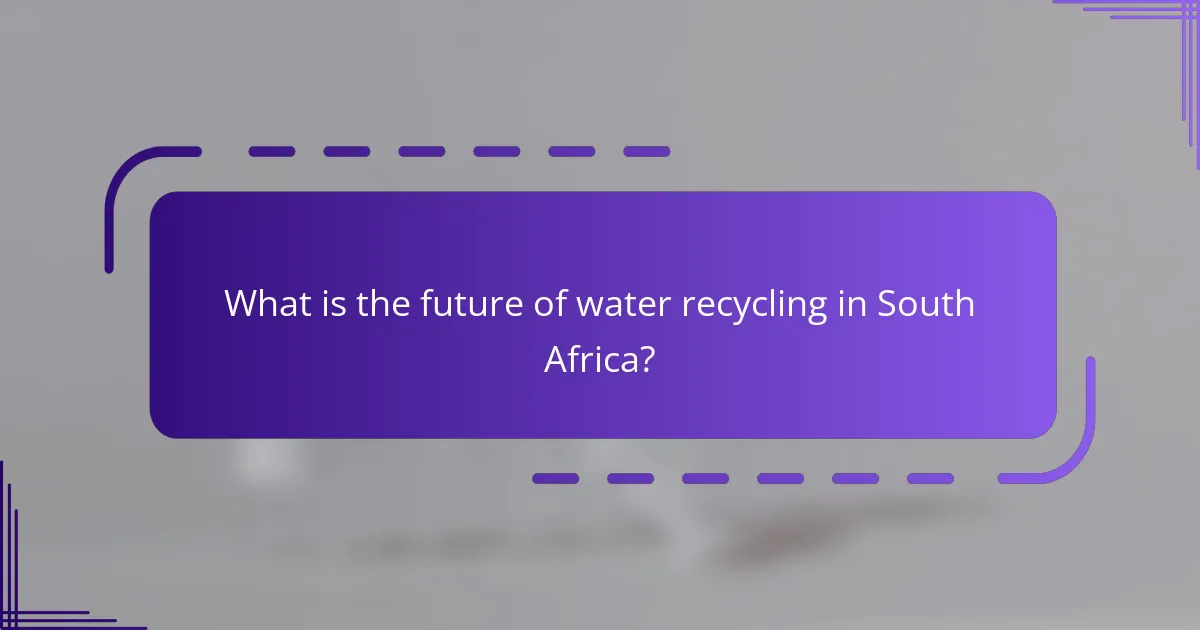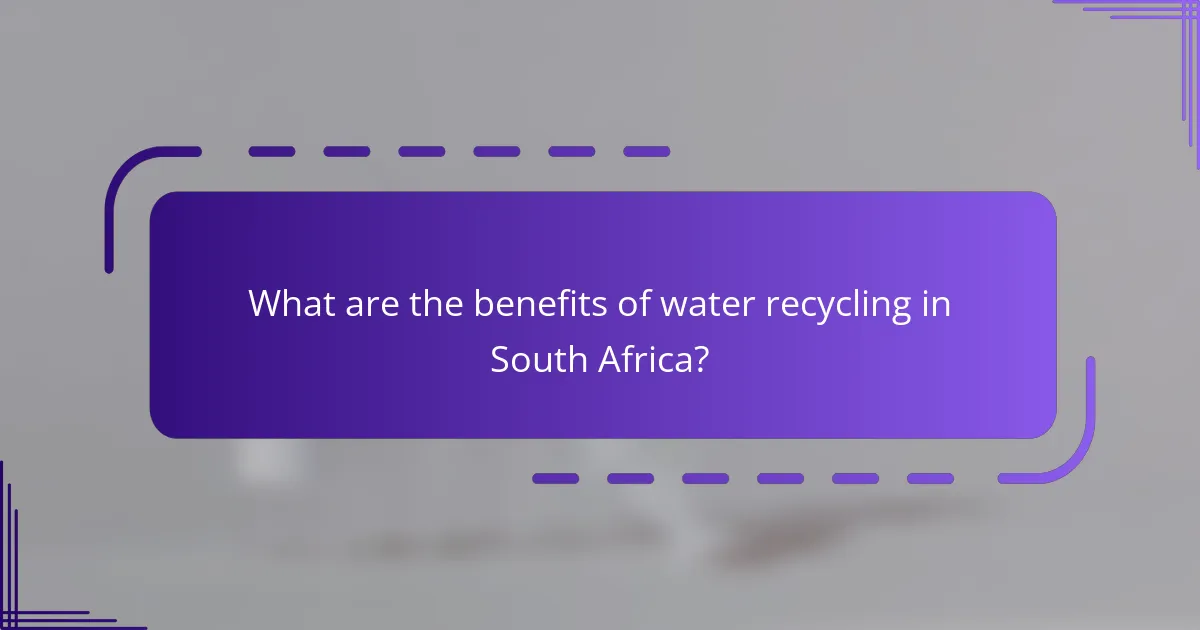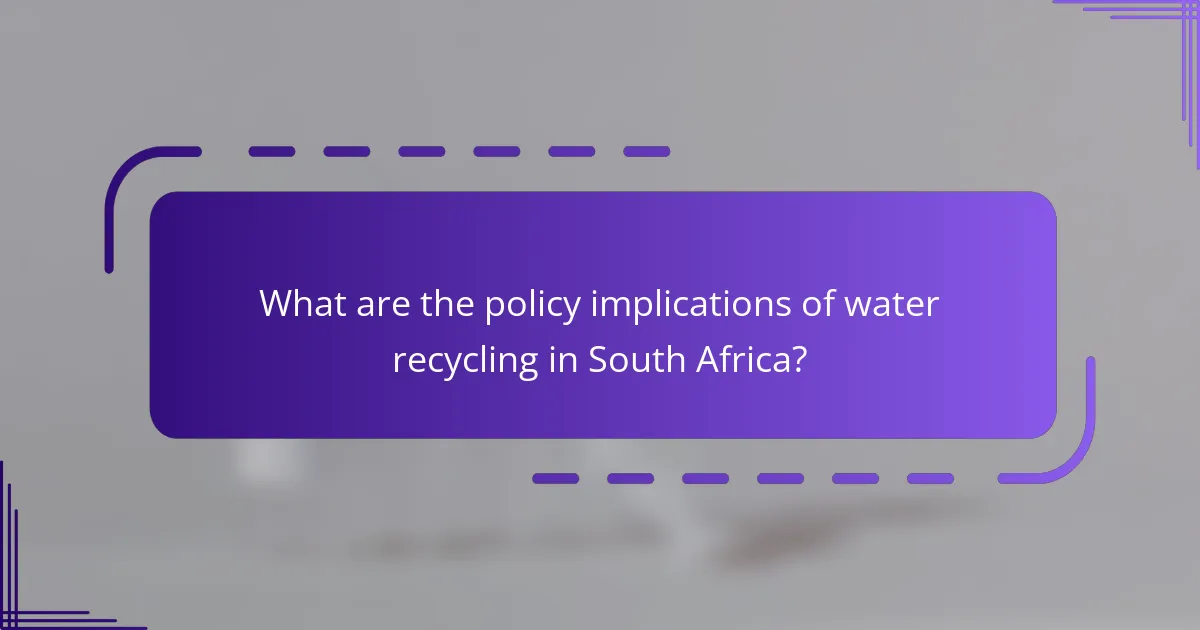The article focuses on the future of water recycling in South Africa, highlighting its significance for sustainable water management amid increasing water scarcity driven by climate change and population growth. It discusses advanced technologies such as filtration and membrane bioreactors that improve water quality and the government’s commitment to recycling 30% of wastewater by 2030. The benefits of water recycling include conserving freshwater resources, supporting agriculture, and enhancing environmental sustainability. Additionally, the article outlines the policy implications of water recycling, emphasizing the need for effective regulations, public health considerations, and collaboration between government and private sectors to ensure long-term water security.

What is the future of water recycling in South Africa?
The future of water recycling in South Africa is promising and vital for sustainable water management. Increased water scarcity due to climate change and population growth drives the need for innovative recycling solutions. Technologies such as advanced filtration and membrane bioreactors are being developed to enhance water quality. The government is implementing policies to support water recycling initiatives. Investment in infrastructure for wastewater treatment is also increasing. According to the Department of Water and Sanitation, South Africa aims to recycle 30% of wastewater by 2030. This goal reflects a commitment to sustainable practices and resource conservation. Overall, the future of water recycling in South Africa is focused on technological advancement and effective policy implementation.
How is water recycling defined in the South African context?
Water recycling in the South African context is defined as the process of treating wastewater for reuse. This process aims to conserve water resources and reduce the demand on freshwater supplies. It involves various treatment methods to ensure water quality meets safety standards for different uses. In South Africa, water recycling is increasingly important due to water scarcity issues. The government promotes water recycling initiatives to support sustainable water management. According to the Department of Water and Sanitation, effective recycling can significantly alleviate pressure on existing water sources.
What are the key components of water recycling systems?
The key components of water recycling systems include collection, treatment, storage, and distribution. Collection systems gather wastewater from various sources. Treatment processes involve physical, chemical, and biological methods to remove contaminants. Storage facilities hold treated water until needed for reuse. Distribution systems transport recycled water to end users, ensuring safety and compliance with regulations. Each component plays a vital role in the efficiency and effectiveness of water recycling initiatives.
What challenges does South Africa face in implementing water recycling?
South Africa faces several challenges in implementing water recycling. Limited infrastructure hampers effective recycling processes. Financial constraints restrict investment in necessary technologies. Public perception and acceptance of recycled water remain low. Regulatory frameworks are often inadequate or unclear. Additionally, water quality standards can complicate recycling efforts. Climate variability impacts water availability, making recycling more critical yet challenging. Lastly, a lack of skilled personnel hinders the development and maintenance of recycling systems.
Why is water recycling important for South Africa?
Water recycling is crucial for South Africa due to its water scarcity challenges. The country faces severe droughts and limited freshwater resources. Water recycling helps alleviate pressure on these resources by treating wastewater for reuse. This process can significantly increase water availability for agriculture, industry, and domestic use. In urban areas, recycled water can support non-potable applications like irrigation and toilet flushing. According to the Department of Water and Sanitation, water recycling can contribute to sustainable water management. It is essential for enhancing resilience against climate variability and ensuring water security.
What are the environmental benefits of water recycling?
Water recycling significantly reduces environmental impact. It conserves freshwater resources, which are increasingly scarce. According to the World Health Organization, water recycling can save up to 50% of potable water usage in urban areas. This process also minimizes wastewater discharge into natural water bodies. By reducing pollutants, it protects aquatic ecosystems. Additionally, water recycling lowers energy consumption associated with water treatment. The Environmental Protection Agency states that recycled water can reduce greenhouse gas emissions. Overall, water recycling supports sustainable water management practices.
How does water recycling contribute to water security?
Water recycling enhances water security by increasing the availability of usable water. It allows for the treatment and reuse of wastewater, reducing reliance on freshwater sources. In regions facing water scarcity, recycled water can supplement drinking water supplies. For instance, in South Africa, water recycling initiatives can help mitigate the impacts of drought. According to the Water Research Commission, effective water recycling can significantly reduce the demand on natural water resources. This process also helps in maintaining ecological balance by returning treated water to water bodies. Overall, water recycling is a critical strategy for ensuring sustainable water management.
What technologies are driving water recycling advancements in South Africa?
Advanced membrane filtration technologies, such as reverse osmosis and microfiltration, are driving water recycling advancements in South Africa. These technologies effectively remove contaminants from wastewater. They enable the purification of water for reuse in various sectors. Biological treatment methods, including activated sludge processes, are also significant. These methods enhance the breakdown of organic matter. Additionally, UV disinfection technology ensures the safe reuse of treated water. Innovations in smart water management systems optimize water recycling processes. These systems utilize real-time data for efficient operations. Overall, these technologies contribute to sustainable water management in South Africa.
What innovative technologies are being used in water recycling?
Innovative technologies in water recycling include membrane bioreactors, advanced oxidation processes, and reverse osmosis. Membrane bioreactors combine biological treatment and membrane filtration. This technology effectively removes pathogens and organic matter. Advanced oxidation processes use powerful oxidants to break down contaminants. These processes enhance water quality significantly. Reverse osmosis employs semi-permeable membranes to separate impurities from water. This method produces high-quality recycled water. Additionally, smart sensors and IoT technology optimize water treatment processes. These innovations improve efficiency and reduce operational costs.
How do these technologies improve efficiency in water recycling processes?
Technologies improve efficiency in water recycling processes by enhancing treatment speed and reducing energy consumption. Advanced filtration methods, such as membrane bioreactors, streamline the removal of contaminants. This leads to faster processing times compared to traditional systems. Automation in monitoring and control systems optimizes operational parameters. Real-time data analysis allows for immediate adjustments, minimizing downtime. Additionally, energy-efficient technologies lower operational costs, making recycling more sustainable. According to the Water Research Commission, implementing these technologies can increase water recovery rates by up to 30%.

What are the benefits of water recycling in South Africa?
Water recycling in South Africa offers numerous benefits. It conserves freshwater resources, which are increasingly scarce due to climate change. Water recycling reduces the demand on existing water supplies. This process also helps in treating wastewater, making it safe for reuse. It supports agricultural practices by providing irrigation water. Moreover, water recycling enhances environmental sustainability by reducing pollution in natural water bodies. According to the South African Department of Water and Sanitation, recycled water can contribute up to 15% of the total water supply in urban areas. This approach promotes economic growth by creating jobs in the water treatment sector. Overall, water recycling is vital for ensuring water security in South Africa.
How does water recycling impact local communities?
Water recycling positively impacts local communities by enhancing water availability and sustainability. It provides a reliable source of water for drinking, irrigation, and industrial use. Communities experience reduced pressure on natural water sources. This process can also lower water treatment costs for municipalities. Additionally, water recycling helps mitigate the effects of droughts and climate change. Studies show that regions implementing water recycling see increased resilience to water scarcity. For instance, in South Africa, water recycling initiatives have led to improved agricultural productivity. Overall, water recycling fosters community development and environmental protection.
What economic advantages does water recycling offer?
Water recycling offers significant economic advantages. It reduces the cost of water supply by decreasing reliance on traditional water sources. This leads to lower operational costs for municipalities. Additionally, water recycling can enhance agricultural productivity. Reclaimed water is often used for irrigation, which can improve crop yields. Studies show that using recycled water can save farmers up to 30% on water costs. The process also creates jobs in water treatment facilities. Furthermore, investing in water recycling infrastructure can stimulate local economies. Overall, water recycling contributes to long-term economic sustainability.
How can water recycling enhance public health?
Water recycling can enhance public health by reducing the spread of waterborne diseases. It provides a reliable source of clean water for drinking and sanitation. Access to clean water helps prevent illnesses such as cholera and dysentery. According to the World Health Organization, improved water quality can significantly decrease morbidity rates. Additionally, water recycling minimizes the contamination of natural water sources. This leads to healthier ecosystems, which support overall community health. Implementing effective water recycling systems can also alleviate pressure on municipal water supplies. This ensures that more people have access to safe water, further promoting public health.
What role does water recycling play in sustainable development?
Water recycling plays a crucial role in sustainable development by conserving water resources and reducing environmental impact. It allows for the reuse of water in various sectors, such as agriculture and industry. This practice helps to alleviate water scarcity, especially in regions facing drought. According to the United Nations, water recycling can reduce the demand for freshwater by up to 50%. Additionally, it minimizes wastewater discharge into natural water bodies, protecting ecosystems. Implementing water recycling technologies can also lower energy consumption associated with water treatment. Thus, water recycling is essential for promoting sustainable water management and enhancing resilience against climate change.
How does water recycling support agricultural practices?
Water recycling supports agricultural practices by providing a sustainable source of irrigation water. It reduces dependency on freshwater resources, which are often limited. Recycled water can be treated to meet safety standards for agricultural use. This practice enhances crop yield and quality by ensuring a consistent water supply. According to the Water Research Commission, water recycling can increase agricultural productivity by up to 30%. Additionally, it helps in managing water scarcity in arid regions. This method also contributes to soil health by returning nutrients to the land. Overall, water recycling is a vital strategy for sustainable agriculture.
What are the implications for urban planning and infrastructure?
Water recycling significantly impacts urban planning and infrastructure. It necessitates the integration of advanced treatment facilities into existing systems. Urban planners must consider space for these facilities in densely populated areas. Infrastructure must be adapted to handle recycled water distribution. This includes retrofitting pipes for dual water supply systems. Additionally, regulations and policies must evolve to support water recycling initiatives. Investment in education about water recycling is essential for public acceptance. Research indicates that cities adopting water recycling can reduce water scarcity risks. The implementation of such systems can enhance sustainability in urban environments.

What are the policy implications of water recycling in South Africa?
The policy implications of water recycling in South Africa include improved water security and enhanced resource management. Effective water recycling policies can help mitigate the impacts of drought and water scarcity. They encourage sustainable water use practices across various sectors. Additionally, these policies can promote investment in water treatment technologies. Regulations may need to address public health and safety concerns regarding recycled water. Furthermore, collaboration between government and private sectors is essential for successful implementation. Evidence from the South African National Water Resource Strategy highlights the importance of integrated water resource management. This approach supports the long-term sustainability of water resources in the region.
What current policies govern water recycling efforts?
Current policies governing water recycling efforts in South Africa include the National Water Act of 1998 and the National Water Resource Strategy. The National Water Act establishes the legal framework for water management, including the promotion of water recycling. The National Water Resource Strategy outlines objectives for sustainable water use and encourages the reuse of treated wastewater. Additionally, various municipal bylaws and provincial regulations support local water recycling initiatives. These policies aim to address water scarcity and promote sustainable practices. They are crucial for enhancing water security in a country facing significant water challenges.
How effective are these policies in promoting water recycling?
These policies are highly effective in promoting water recycling. They establish regulatory frameworks that incentivize water reuse initiatives. For instance, South Africa’s National Water Act encourages the development of water recycling technologies. The policies also provide financial support for projects that enhance water recycling capabilities. Research indicates that regions implementing these policies have seen a significant increase in water recycling rates. A study by the Water Research Commission found that areas with supportive policies recycled up to 30% more water compared to those without. Overall, these policies play a crucial role in advancing sustainable water management practices.
What gaps exist in the current regulatory framework?
The current regulatory framework for water recycling in South Africa has significant gaps. One major gap is the lack of comprehensive guidelines specifically addressing water recycling practices. Existing regulations often focus on water supply and sanitation but do not adequately cover recycling processes. Additionally, there is insufficient integration between different regulatory bodies overseeing water management. This fragmentation leads to inconsistent policies and enforcement.
Another gap is the absence of clear standards for water quality in recycled water. The absence of these standards can hinder public trust and adoption of recycled water. Furthermore, there is limited public awareness and education regarding the benefits and safety of water recycling. This gap affects community engagement and acceptance of recycling initiatives.
Lastly, the regulatory framework does not sufficiently incentivize innovation in water recycling technologies. Without incentives, the adoption of advanced technologies may lag. Addressing these gaps is crucial for the successful implementation of water recycling in South Africa.
What future policies could enhance water recycling initiatives?
Future policies that could enhance water recycling initiatives include stricter regulations on wastewater discharge. Implementing incentives for industries to adopt recycling technologies can also be effective. Establishing funding programs for municipal water recycling projects will support local initiatives. Additionally, promoting public awareness campaigns can encourage community participation in recycling efforts. Integrating water recycling into urban planning ensures sustainable development. Collaborating with private sectors can drive innovation in recycling technologies. Implementing tiered water pricing can motivate conservation and recycling practices. Lastly, setting national standards for recycled water quality will build public trust in recycled water usage.
How can stakeholder engagement improve policy effectiveness?
Stakeholder engagement can significantly improve policy effectiveness by fostering collaboration and ensuring diverse perspectives are considered. Engaging stakeholders allows policymakers to gather valuable insights that reflect the needs of the community. This engagement leads to increased transparency and trust among stakeholders. Research shows that policies developed with stakeholder input are more likely to be accepted and implemented successfully. For instance, studies indicate that inclusive policy-making processes can enhance compliance rates by up to 30%. Furthermore, stakeholder engagement can identify potential challenges early, allowing for proactive solutions. This proactive approach minimizes resistance and enhances the overall success of the policy.
What best practices should be adopted for successful implementation?
Successful implementation of water recycling in South Africa requires stakeholder engagement, robust policy frameworks, and technology integration. Stakeholder engagement ensures diverse input and support from communities, industries, and government. A robust policy framework provides clear guidelines and regulations, promoting compliance and accountability. Technology integration involves adopting advanced recycling methods, such as membrane bioreactors and advanced oxidation processes, to enhance efficiency. Training and capacity building for local operators is crucial for effective system management. Monitoring and evaluation mechanisms must be established to assess performance and adapt strategies. These practices align with successful examples globally, such as Singapore’s NEWater program, which demonstrates the effectiveness of comprehensive approaches in water recycling initiatives.
What practical steps can be taken to promote water recycling in South Africa?
Implementing educational programs can promote water recycling in South Africa. These programs should inform citizens about the benefits and methods of water recycling. Encouraging local communities to adopt water-saving practices is essential. Incentives for households and businesses that recycle water can drive participation. Establishing partnerships with industries to treat and reuse wastewater is also beneficial. Investing in infrastructure for greywater systems can facilitate easier recycling. Government policies must support water recycling initiatives through funding and regulations. Finally, showcasing successful water recycling projects can inspire wider adoption.
What community initiatives can support water recycling efforts?
Community initiatives that can support water recycling efforts include educational programs, community gardens, and local recycling projects. Educational programs raise awareness about the importance of water conservation and recycling. They can inform residents about methods to recycle water at home. Community gardens can utilize recycled water for irrigation, promoting sustainable practices. Local recycling projects can involve collecting greywater for reuse in non-potable applications. Collaboration with local governments can enhance these initiatives. In South Africa, programs like the Water Wise campaign have shown success in promoting water-saving practices.
How can individuals contribute to water recycling practices?
Individuals can contribute to water recycling practices by adopting water-saving habits at home. Simple actions like fixing leaks can prevent water waste. Collecting rainwater for gardening also promotes recycling. Using greywater systems for irrigation reduces the demand for fresh water. Choosing water-efficient appliances minimizes water usage. Participating in community recycling programs raises awareness about water conservation. Educating others about the importance of water recycling fosters a culture of sustainability. These efforts collectively support broader water recycling initiatives.
The main entity of the article is water recycling in South Africa. The article provides a comprehensive overview of the future of water recycling, highlighting the importance of innovative technologies, such as advanced filtration and membrane bioreactors, in addressing water scarcity issues. It discusses the key components of water recycling systems, the challenges faced in implementation, and the environmental and economic benefits of recycling wastewater. Additionally, the article examines current policies and regulatory frameworks, identifies gaps, and suggests future policy enhancements to promote water recycling initiatives effectively.